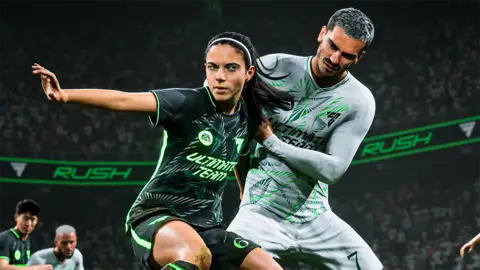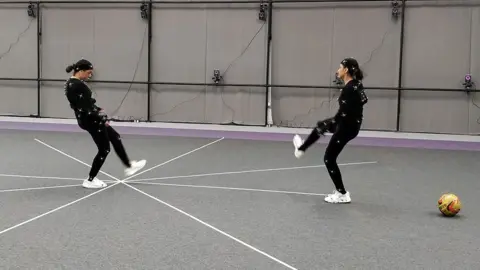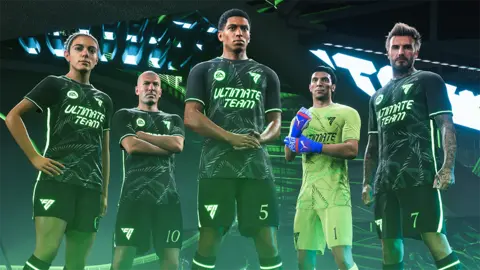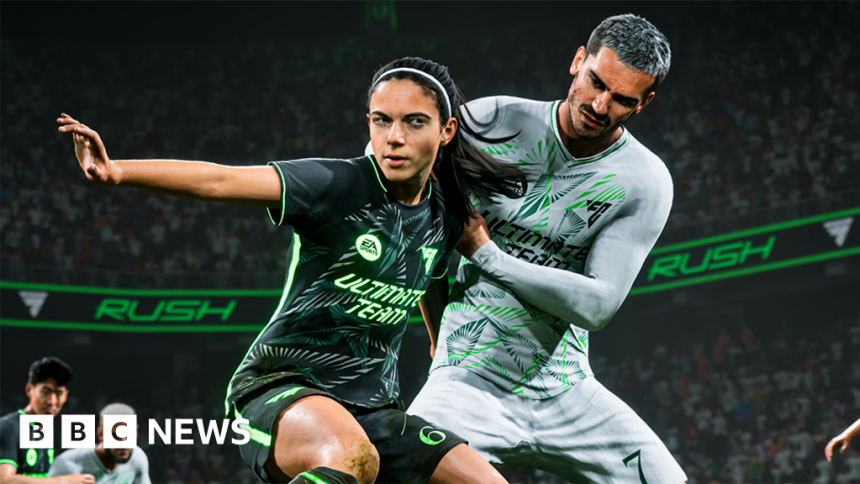Female players finally get management moment in video games
 EA
EAHave you ever watched your football team get thrashed – again – looked over at the manager in the dugout and thought: “I could do better”?
Management video games have been giving fans a chance to put their – imaginary – money where their mouth is for years.
But usually only in the men’s game.
However, this year two of the world’s biggest football titles – EA FC and Football Manager – are allowing players to take charge of female teams too.
BBC Newsbeat spoke to the makers of both and the creators of new mobile title Matchday Champions about bringing women into the beautiful (video) game.
What’s taken so long?
EA FC is one of the most-played games globally, and also includes a career mode that lets you play as a footballer or a manager.
This year it’s introducing women to the mode for the first time.
Female players first appeared in Fifa 16 – when maker Electronic Arts had the rights to use the football governing body’s name – and last year were added to EA FC’s Ultimate Team mode.
Fans who’ve been asking for the change for a while say it’s taken a long time to come, but Andreas Wilsdorf, a line producer on career mode, tells Newsbeat a few things needed to happen first.
“It would have been great to do with Fifa 16,” says Andreas.
But he feels “women’s football has evolved a lot” and there’s a better understanding of the demand to play with female teams.
When EA unveiled its first non Fifa-branded title last year it spent a lot of time outlining the various deals it had done with leagues, players and clubs to use them in the game.
“For a career mode to really make sense and work we need enough licences for it to be there,” says Andreas.
He says French, Spanish, US, German and UK leagues came on board last year, which gave the team enough material to start incorporating female squads.
 Sports Interactive
Sports InteractiveFootball Manager makers Sports Interactive first announced their intention to introduce female players to the game three years ago.
Head of women’s football research, Tina Keech, says it’s been “hard graft” gathering everything they needed.
The game’s stats live in a huge database – Tina says they’ve been gathering the necessary info on men for 20 years.
For the women’s leagues they had to start from scratch.
“One of the really difficult issues we’ve had was finding information,” she says.
“I could go online, probably find Harry Kane’s cousin’s dog’s name.
“Whereas in the women’s game, you struggle for basic information on them.”
Tina says it was also important to make sure any details that were online were actually accurate.
And, says Tina, who hadn’t worked in the industry before joining Foootball Manager: “You underestimate how much work goes into making a video game.
“We want to do it properly, and that’s why it’s taken so long. We want it to be authentic.”
Keeping it real
Realism is a big draw for fans of management sims, and both EA FC and Football Manager have kept salaries and transfer fees for women players in line with the real world, where amounts tend to be much higher in the men’s game.
But Andreas says the EA FC team has made a few concessions – such as the venues where matches in the game take place.
Using his home club Frankfurt as an example, he says the women’s squad usually plays at a smaller stadium but all the matches in EA FC take place in the Deutsche Bank Park.
It’s the largest stadium in the German city, where the ladies team’s bigger fixtures are held in real-life.
On a practical level, it means the team doesn’t need to recreate another venue inside the game.
But, says Andreas: “We wanted to make an aspiration.
“It should be in the biggest stadiums. It deserves to be there.
“We’ve seen it with the Champions League, with Barcelona filling the Camp Nou.”
Both games allow players to switch career paths – or “do a Phil Neville” – by switching between managing male and female teams within a single playthrough.
The emphasis on realism means there’s no ability to mix squads in Football Manager or EA FC’s career mode.
 Matchday
MatchdayOne game that’s done things a bit differently is Matchday Champions – a mobile management title where players can build mixed squads.
Co-founder Sebastien de Halleux tells Newsbeat the company wanted to “lean into the beauty of video games”.
“You can imagine something that does not exist in reality,” he says.
The game – which is centred around collecting player cards – is based on real stats, but Sebastian says they wanted to reach as wide an audience as possible.
That might be something to do with the fact that mobile games often attract more female players, and Matchday Champions is a more casual experience than the more established titles.
But Sebastian says it’s a mistake to assume “women like women in football or men like men’s football”.
“When you look at kids in a park, you have as many young girls and young boys playing the sport,” he says.
“It’s only later at the professional level and above that the difference is felt more strongly.
“We think there is nothing that prevents the fandom from being co-gendered and the players represented in that field.”
 EA
EAVideo game bosses are always looking for ways to boost their audiences – more people playing your titles means more revenue.
But those Newsbeat spoke to insisted they also want to have a real-world impact.
Matchday’s funded by football great Lionel Messi’s investment fund, and Spanish legend Alexia Putellas has also been involved with the game.
She previously told Newsbeat she believed giving fans the ability to mix squads helped the women’s game to accelerate its profile.
EA FC’s Andreas says a conversation with his accountant, who told him his daughter was a fan but was sad she couldn’t take her favourite players through a full season, inspired him.
“I could remember myself at that age playing the game and being able to do that,” he says.
“That showed exactly the effect we wanted – that little girls can now play as their heroes or create themselves and play with their heroes.”
Tina, from Sports Interactive, is also a former player and says her football fan daughters made her want to become “part of the movement of pushing women’s football.”
“They’re the next generation.
“They’re the ones that are going to be seeing all of this,” she adds.









